Context
Global population growth poses a threat to food security in an era of increased ecosystem degradation, climate change, soil erosion, and biodiversity loss. Indian farmers have become heavily dependent on chemical fertilizers which are often considered to be cost-effective in the short term because they can quickly and efficiently provide the necessary nutrients for crops to grow. However, it has several negative impacts on the environment and human health. It’s worth noting that there are also examples of farmers in India who have been able to successfully transition to more sustainable and organic farming methods despite the challenges but time-consuming production, slow Nutrient release, high production cost makes the ecofriendly organic fertilizer less efficient in terms of agricultural production. To bridge this gap enrichment of soil microbes can bring a significant change in agricultural process in an eco- friendly way.
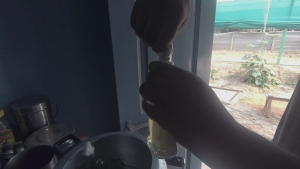
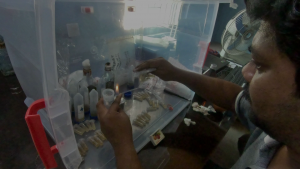
Biofertilizers are living microbes that enhance plant nutrition by either by mobilizing or increasing nutrient availability in soils. Biopesticide is a group of naturally occurring living microbes (mostly fungi) that reduce the pest infestation. However this technology still not widely taken up by the agricultural community due to some major issues such as high cost, technical skill for production and utilization which is a significant gap in the application area and a drawback for proper implementation of this microbe based biofetilizer application technology. Our goal is to develop a low cost biofertilizer production unit and train required skills to agricultural people to make this technology a successful.
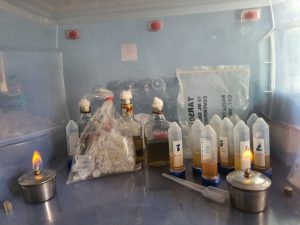
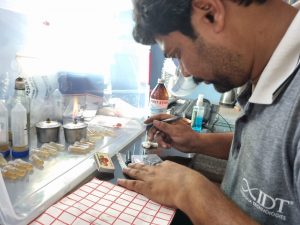
Benefit of using Biofertilizers and biopesticides
Bio-fertilizers and biopesticides are important for the Indian context for several reasons. Firstly, India has a large and diverse agriculture sector that is crucial for food security and the livelihoods of millions of people. However, the intensive use of chemical fertilizers and pesticides has led to several negative consequences such as soil degradation, water pollution, and health hazards for farmers and consumers. Secondly, bio-fertilizers are an eco-friendly alternative to chemical fertilizers, as they are made from natural sources such as nitrogen-fixing bacteria, phosphorus-solubilizing fungi, and other microorganisms that can enhance soil fertility and crop productivity. They also help to reduce greenhouse gas emissions and improve soil health over the long term.
 b
b 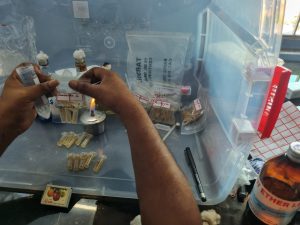
Thirdly, biopesticides are a safer and more sustainable alternative to chemical pesticides, as they are made from natural sources such as plant extracts, microbes, and insect pheromones that can control pests and diseases without harming the environment or human health. They also reduce the risk of pesticide residues in food and water and can help to preserve beneficial insects and biodiversity. Fourthly, the use of bio-fertilizers and biopesticides can also benefit small and marginal farmers who may not have access to or can afford chemical inputs. They can also help to promote organic farming practices and reduce dependence on imported inputs.
Our invention and proposed solution
We have developed an indigenous low-cost and low-tech method to culture biopesticide and biofertilizer. We have developed a media for culturing these microbes using a combination of molasses, gram flour and potato extract. The growth of the microbes in this media is be
comparable to costly commercial alternatives. Our developed method also does not require any incubator or shaker. Within 24 hours, the microbial growth reaches to its peak and ready to be used in the field. The culture does not require any sophisticated instrumentations as we replaced it with available alternatives. Our goal is to set-up a rural microbiological laboratory which will be operated by the trained farmer to produce beneficial bacteria at large scale.
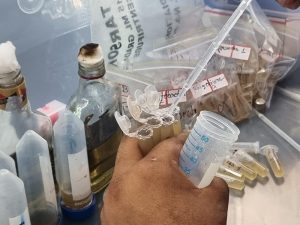
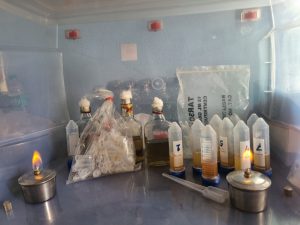
Proposed Objectives
- Set up a production unit for large scale production of bio-fertilizer and bio-pesticide for Sustainable socio-economic development of farmers.
- Capacity building and training for farmers to make them self-sufficient in biofertilizer and biopesticide production.
- Field testing for production and soil fertility improvement.
Field partner
Field set-up of the laboratory, training and testing will be done at Raiganj, West Bengal where our field implementation partner “Forum for Indigenous Agricultural Movement (FIAM)” is working with 2000 organic farmers. The field test will be done in the land of 10 farmers in next eight months for different crops. Another field testing will be carried out in Balagarh, West Bengal where a group of 20 organic farmers works with us.
Name, Address & Contact Details of PI:
- Dr Srijan Haldar, Department of Biological Science, School of Life Science and Biotechnology, Adamas University, Barasat-Barrackpore Road, Barbaria,P.O.- Jagannathpur, District-24 Parganas(North), Kolkata-700 700126
- Dr Sandip Sankar Ghosh, The Climate Thinker, 38/31 Bhuban Mohan Roy Road, Kolkata 700008
Area of proposed work: Livelihood & skill development Project time – 1year
